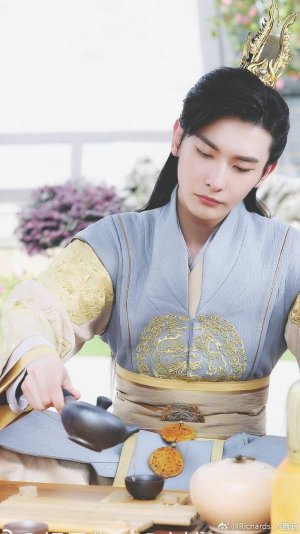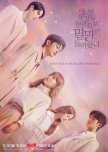A Drama for Philosophers and Deep Thinkers
(I tried to not write spoilers, but to leave little cues that might also make your viewing experience more enjoyable if you read the review before you watch it.)
So, for me this a drama with so many layers, I don't even know where to start.
At the beginning all I could do was just go with the feelings it created. I think the cinematography and storytelling is so well done, you can just float by on the feelings it creates if you let yourself. Turn off the logical brain and just let yourself be there with these people, living and knowing they will soon die. The pain of it, and the twisted turns the human heart takes to the point of relief.
And that is the second layer. People do start acting weird when they hear the clock ticking, the existential dread causing people to go through all the stages of grief.
Denial
Anger
Bargaining
Depression/Grief
Acceptance
This can be seen in all the "restarts" the drama takes. Understandably this was boring for some, but it made a lot of sense to me. I don't want to get too spoilery, but if you have watched it, you can see these stages clearly.
Having had cancer-scare (it was something else, thank deity) myself this year, I understood Dong-Kyungs every emotion and reaction right of the bat. Pretending like it was nothing, getting angry, getting sad, worrying about the people you leave behind, getting upset by the injustice of it and even wishing they would forget about you.
Another layer was Myul Mang and Dong Kyungs journeys to leading fulfilled lives.Both are depressed and wish the world could just end, so they would not have to suffer ever again.
Both felt lonely and out of place, both processing their negative feelings about suffering in different ways, one by being apathetic and resentful and the other by being people pleasing and internalising pain to an unhealthy degree.
One needed to learn how to love, even when faced with the inevitable ending and the other needed how to be selfish, even when faced with the inevitable ending. To truly live means to grow, and to grow means to accept suffering and joy all the same.
What can be more poetic than having to learn to love Doom in order to surive?
Another layer to me was the religious aspects, of having two deitys, one the creator, one the destroyer and both have been made by and for man to explain the randomness of suffering. This is part of many religions. But especially Buddhism has this ethos of having to go through the same suffering in different ways until you accept fate and learn the lesson in this life and grow. Here again, the frequent repetition of their old patterns is explained. Especially the part in the middle where they can both can see what they would have been had they not grown through their pain and their joy in each other.
A whole other layer is hidden in the many symbolisms, the flower, the strange dialogues, pictures and books mentioned in the show. Admittedly, I had to watch every episode twice to really catch them, having been taken up with the emotion of it in the first run. I knew I was missing something, even though I am a philosophy nerd, but one of the more obvious ones was the Pinocchio reference (from puppet to man) and the butterfly metaphor (creeping, metamorphosis, which is basically dying and being rebuilt, and then flying). What I was missing, was that a lot of the dialogue and scenes are based on Nietzsches book "Thus spoke Zarathustra", because I haven't read it, duh. If you want to know more about this, I recommend this blog: https://mindmeltonabun-blog.tumblr.com/tagged/doom-at-your-service
Btw, I am not one to care about OSTs much, unless they are extraordinary, but here I really noticed how well it was cut together with what was happening in the scene.
And no, I don't want to talk about Ep.15. I never rate dramas on their wrap up episodes, because let's admit it, most of them are a mess.
So, for me this a drama with so many layers, I don't even know where to start.
At the beginning all I could do was just go with the feelings it created. I think the cinematography and storytelling is so well done, you can just float by on the feelings it creates if you let yourself. Turn off the logical brain and just let yourself be there with these people, living and knowing they will soon die. The pain of it, and the twisted turns the human heart takes to the point of relief.
And that is the second layer. People do start acting weird when they hear the clock ticking, the existential dread causing people to go through all the stages of grief.
Denial
Anger
Bargaining
Depression/Grief
Acceptance
This can be seen in all the "restarts" the drama takes. Understandably this was boring for some, but it made a lot of sense to me. I don't want to get too spoilery, but if you have watched it, you can see these stages clearly.
Having had cancer-scare (it was something else, thank deity) myself this year, I understood Dong-Kyungs every emotion and reaction right of the bat. Pretending like it was nothing, getting angry, getting sad, worrying about the people you leave behind, getting upset by the injustice of it and even wishing they would forget about you.
Another layer was Myul Mang and Dong Kyungs journeys to leading fulfilled lives.Both are depressed and wish the world could just end, so they would not have to suffer ever again.
Both felt lonely and out of place, both processing their negative feelings about suffering in different ways, one by being apathetic and resentful and the other by being people pleasing and internalising pain to an unhealthy degree.
One needed to learn how to love, even when faced with the inevitable ending and the other needed how to be selfish, even when faced with the inevitable ending. To truly live means to grow, and to grow means to accept suffering and joy all the same.
What can be more poetic than having to learn to love Doom in order to surive?
Another layer to me was the religious aspects, of having two deitys, one the creator, one the destroyer and both have been made by and for man to explain the randomness of suffering. This is part of many religions. But especially Buddhism has this ethos of having to go through the same suffering in different ways until you accept fate and learn the lesson in this life and grow. Here again, the frequent repetition of their old patterns is explained. Especially the part in the middle where they can both can see what they would have been had they not grown through their pain and their joy in each other.
A whole other layer is hidden in the many symbolisms, the flower, the strange dialogues, pictures and books mentioned in the show. Admittedly, I had to watch every episode twice to really catch them, having been taken up with the emotion of it in the first run. I knew I was missing something, even though I am a philosophy nerd, but one of the more obvious ones was the Pinocchio reference (from puppet to man) and the butterfly metaphor (creeping, metamorphosis, which is basically dying and being rebuilt, and then flying). What I was missing, was that a lot of the dialogue and scenes are based on Nietzsches book "Thus spoke Zarathustra", because I haven't read it, duh. If you want to know more about this, I recommend this blog: https://mindmeltonabun-blog.tumblr.com/tagged/doom-at-your-service
Btw, I am not one to care about OSTs much, unless they are extraordinary, but here I really noticed how well it was cut together with what was happening in the scene.
And no, I don't want to talk about Ep.15. I never rate dramas on their wrap up episodes, because let's admit it, most of them are a mess.
Considerați utilă această recenzie?

























